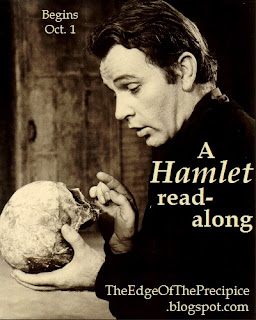 |
| John Austen |
Hamlet Act II Scene I
Polonius sends his servant, Reynaldo, to France to give letters to his son. He then gives very specific instructions as to how Reynaldo is to find out information about Laertes and how he conducts himself in the city. Polonius is very insistent and detailed in his commands, and his suspicions about Laertes drinking, whoring and gambling is apparent.
When Reynaldo takes his leave, Ophelia enters and relates
some strange events. Hamlet
appeared to her all in disarray, almost mad in his appearance. He made some dramatic and pained
gestures that quite concerned her, before he departed her presence and she does
not know what to make of his behaviour.
Polonius is certain that Ophelia’s spurning of Hamlet has made him mad
with love for her and suggests that they speak with the king.
 |
| Polonius & Ophelia (1830) H.C. Selous |
Thoughts:
Why is Polonius almost over-zealous in his curiosity about Laertes? Reynaldo is certainly a spy sent to report on him. This scene says more about Polonius’ character, even though the focus is on Laertes. Polonius is obsessive in his desire to know about his son, and his words and actions are not balanced. He obviously doesn't trust him, but why? Does his unusual inquisitiveness stem from political or paternal concerns?
He also shows himself an astute politician, or perhaps manipulator, when he decides to tell Claudius of Hamlet’s actions, noting that if he keeps them hidden, it might cause trouble for him in the long run.
He also shows himself an astute politician, or perhaps manipulator, when he decides to tell Claudius of Hamlet’s actions, noting that if he keeps them hidden, it might cause trouble for him in the long run.
Hamlet Read-Along Posts
Act I Scene I
Act I Scene II
Act I Scene III
Act I Scene IV
Act I Scene V
Act II Scene I
Act I Scene I
Act I Scene II
Act I Scene III
Act I Scene IV
Act I Scene V
Act II Scene I

I kind of always thought and I could be wrong, that Polonious was a Master politician and all his actions stem from them; whether his actions towards his son Laertes or towards Claudius...its just that these actions have disastrous results, which shows that he seriously lacked judgement!
ReplyDeleteI think that you're right. :-) I don't see any true paternal fondness yet; all his actions seem to be directed towards furthering his political position.
DeleteStrangely, in the next scene (though comedic) he more or less shows that he's something of a fool, which supports your characterization of lacking judgement. I still don't know quite what to make of him, however .....